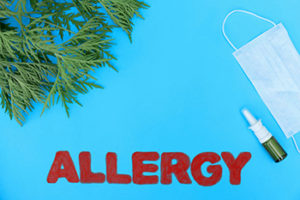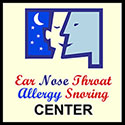Allergy Treatments
 Avoidance is important…
Avoidance is important…
The very best treatment for allergies is to avoid whatever is causing them. While this is not always 100% possible, there are probably things you can do to cut down on your contact with it. Avoiding certain foods, for example, can go a long way in treating food allergies.
But first you need to find out what is causing your symptoms. Come in for allergy testing so we can help you figure out what makes you react and plan a diet to avoid the offending foods.
Inhaled allergens –stuff you breathe in that causes a reaction–are very difficult to avoid unless you can move to a remote island where you can breathe the fresh sea breeze.
Fortunately, until you reach that island, there are many different kinds of medications (and herbal treatments) that can reduce your body’s allergic reactions. Here some common treatment options that we might prescribe for you:
- Antihistamines are usually non-prescription medications that relieve mild to moderate symptoms. But they can make you feel sleepy, so you can’t take them when you are going about your regular daily routine, especially if you’re driving or operating machinery. An example of this type of medication is loratadine, known by the brand name Claritin®, which used to be prescription-only but now is available over-the-counter. This type of medication is called “short-acting”, meaning it must be taken regularly to be effective.
- Other types of antihistamines include fexofenadine, known by the brand name Allegra, and cetirizine, known by the brand name Zyrtec. These can cause less daytime drowsiness but require a prescription from your doctor. Also, these medications are longer-acting, so you may have to take less of them to achieve results.
- Some of the newer antihistamines like Astelin and Patanase® can be applied directly to the nose via a nasal spray.
- The prescription medication Singulair (montelukast) is known scientifically as a leukotriene inhibitor, helping to control asthma symptoms and relieve other symptoms caused by seasonal allergies.
- Nasal sprays containing corticosteroids are another treatment option. Nasal sprays have been found to be very effective and safe for use with allergy sufferers who cannot find relief with antihistamines. Nasal corticosteroid sprays are available by prescription and include Flonase® (fluticasone), Nasonex® (mometasone), and Nasacort® AQ (triamcinolone).
- Nasal moisturizers may be prescribed. These medications lubricate the mucous membranes, and help to relieve irritation and dryness. One commonly prescribed moisturizer is Guaifenesin, also known as Mucinex®.
- Allergy shots , called immunotherapy, are sometimes recommended by your physician. Immunotherapy has been shown to reduce the need for medications and to reduce allergic symptoms. In immunotherapy, your doctor will give you shots that contain a small amount of the substance you are allergic to. This helps your immune system to recognize the allergen and stop over-reacting to it. Allergy shots are effective for most but not all people and regular doctor visits are required over months or years.
- Allergy drops, used in Europe for over 60 years, are not yet FDA approved in the United States, but have been found to be an effective allergy therapy. Allergy drops are ‘sub-lingual’, that is, you place the tablet under your tongue, and the medication is instantly absorbed into your bloodstream, where it is delivered to your immune system.
- If your nose feels congested (stuffy), your doctor may also want you to try a decongestant. Nasal decongestants should not be used for more than a few days at a time, because after long periods of use, they can make your symptoms come back even more severely when you stop– the “rebound” effect. Some decongestants are available in pill form and do not cause a rebound.
It may take a bit of trial and error to find out which medications, or combination of medications, works best in treating your specific symptoms. Some medicines, like the over-the-counter nasal spray Afrin, can become addicting. This is why it is best to remain under a doctor’s care while treating your allergies.
